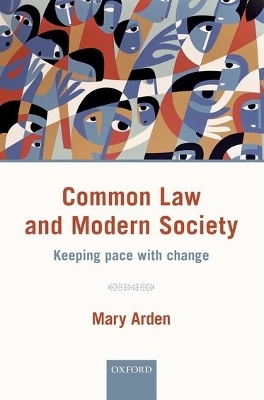
Common Law and Modern Society
Oxford University Press (Verlag)
978-0-19-875584-5 (ISBN)
Law is a lasting social institution, but it must also be open to change. How is law made, and what prompts change? How can society influence the law, and how does the law respond to societal change? The first volume of Shaping Tomorrow's Law examined human rights and European law. In this second volume Mary Arden turns her attention to domestic law, providing a judge's viewpoint on the roles of society, government, and the judiciary in the transformation and reform of the law.
The first section of Common Law and Modern Society explains what we mean by judge-made law and shows how the law responds to the needs of a changing society. Adaptation may be in response to shifting values, or in response to constitutional change. This is demonstrated in chapters on assisted reproduction and assisted dying, both modern concerns, and a far older example, that of the law on water, which has been evolving over the centuries in response to society's changing demands. The law also needs to reflect constitutional change, as in the case of Welsh devolution.
The second section of the book looks at the necessary simplification of the law and systematic legal reform. These tasks lie at the heart of the work of the Law Commission, which celebrated its 50th anniversary in 2015. Drawing on her own experience as former Chairman of the Law Commission, Mary Arden argues that statute law can be made simpler by codification, and that the success of codification may vary depending on the field of law.
The final section looks ahead to tomorrow's judiciary. The accountability of judges is a continuing area of discussion, and this includes ensuring that the reasoning behind their decisions is understood by the relevant people.
Mary Arden goes on to argue that the vision for the judiciary today and tomorrow should be one of greater diversity in the widest sense. This will help to ensure not only greater fairness and wider opportunity but also better decision-making. The book concludes with advice and encouragement for future legal professionals.
The Rt. Hon. Lady Justice Arden DBE was called to the Bar of England and Wales in 1971, and became a Queen's Counsel in 1986. She was appointed a Justice of the High Court of Justice of England and Wales in 1993, the first woman judge to be assigned to the High Court's Chancery Division. From 1996 to 1999 she was the Chair of the Law Commission of England and Wales. She was appointed a Lady Justice of Appeal in 2000. Lady Justice Arden is Head of International Judicial Relations for England and Wales. This makes her responsible for liaison with leading courts across the world. She is also a Member of the Permanent Court of Arbitration in The Hague and an ad hoc judge of the European Court of Human Rights in Strasbourg.
SECTION A - LAW IN A CHANGING SOCIETY; PART I: RESPONDING TO A CHANGING SOCIETY; PART II: ABSORBING THE IMPACT OF CONSTITUTIONAL CHANGE; SECTION B - SIMPLIFICATION AND SYSTEMATIC DEVELOPMENT OF THE LAW; PART III: SYSTEMATIC DEVELOPMENT AND REFORM OF THE LAW; PART IV: MAKING STATUTE LAW MORE ACCESSIBLE; PART V: CODIFICATION; PART VI: THE FUTURE OF JUDGMENT WRITING; PART VII: THE OLD ORDER CHANGETH? THE JUDICIARY IN THE TWENTY-FIRST CENTURY; PART VIII: THE FUTURE IS IN THEIR HANDS
| Erscheint lt. Verlag | 31.12.2015 |
|---|---|
| Verlagsort | Oxford |
| Sprache | englisch |
| Maße | 168 x 236 mm |
| Gewicht | 662 g |
| Themenwelt | Recht / Steuern ► Allgemeines / Lexika |
| Recht / Steuern ► EU / Internationales Recht | |
| Recht / Steuern ► Öffentliches Recht | |
| ISBN-10 | 0-19-875584-8 / 0198755848 |
| ISBN-13 | 978-0-19-875584-5 / 9780198755845 |
| Zustand | Neuware |
| Haben Sie eine Frage zum Produkt? |
aus dem Bereich


